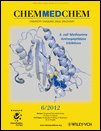
ChemMedChem
Scope & Guideline
Pioneering insights for the next generation of pharmaceuticals.
Introduction
Aims and Scopes
- Medicinal Chemistry and Drug Design:
The core focus is on the design, synthesis, and evaluation of new chemical entities with potential therapeutic applications, particularly in oncology, infectious diseases, and metabolic disorders. - Biological Evaluation and Mechanistic Studies:
Research often includes evaluation of biological activities of compounds, exploring mechanisms of action, and understanding structure-activity relationships (SAR) to optimize therapeutic efficacy. - Nanomedicine and Drug Delivery:
The journal publishes studies on novel drug delivery systems, including nanoparticles and nanocarriers, aimed at enhancing the bioavailability and targeted delivery of therapeutic agents. - Natural Products and Synthetic Derivatives:
Research related to the isolation, modification, and pharmacological evaluation of natural products and their synthetic derivatives is a prominent theme, highlighting their potential as drug candidates. - Chemical Biology and Target Identification:
ChemMedChem includes work on the application of chemical tools to elucidate biological pathways, identify drug targets, and develop new therapeutic strategies. - Innovative Analytical Techniques:
The journal encourages the use of advanced analytical techniques such as molecular modeling, high-throughput screening, and various spectroscopic methods to aid drug discovery.
Trending and Emerging
- Targeted Therapy and Precision Medicine:
Recent publications highlight a growing interest in targeted therapies and precision medicine approaches, focusing on personalized treatment options based on genetic and biomolecular profiling. - Proteomics and Targeted Protein Degradation:
The use of proteomics to identify new drug targets and the development of PROTACs (Proteolysis Targeting Chimeras) for targeted protein degradation are gaining traction, showcasing innovative strategies for drug discovery. - Drug Repurposing Strategies:
There is an increasing trend towards drug repurposing, particularly in the context of emerging diseases such as COVID-19, where existing drugs are evaluated for new therapeutic applications. - Nanotechnology in Therapeutics:
The integration of nanotechnology in drug delivery systems, including the use of nanomaterials for enhanced therapeutic efficacy and imaging, is a rapidly expanding area of interest. - Artificial Intelligence and Machine Learning in Drug Discovery:
The application of AI and machine learning techniques for predictive modeling, compound screening, and optimizing drug design processes is becoming increasingly prominent in recent publications. - Hybrid Molecules and Multitarget Agents:
Research on hybrid molecules that combine multiple pharmacophores or target multiple pathways is on the rise, reflecting a shift towards more complex and effective therapeutic agents.
Declining or Waning
- Traditional Small Molecule Antibiotics:
Research on traditional small molecule antibiotics has decreased, possibly due to a shift towards exploring novel mechanisms of action and the use of combination therapies to combat antibiotic resistance. - Single-Target Therapeutics:
The focus on single-target drug design has waned in favor of multitarget approaches, reflecting a growing understanding of the complexity of diseases and the need for holistic treatment strategies. - In vitro Studies without in vivo Validation:
There is a noticeable decline in standalone in vitro studies that lack in vivo validation, as the field increasingly emphasizes translational research that bridges laboratory findings with clinical relevance. - Basic Chemistry without Biological Context:
Papers that focus purely on synthetic methodologies without direct applications in medicinal chemistry or biological evaluation have seen a reduction, as the journal prioritizes research with clear therapeutic implications.
Similar Journals
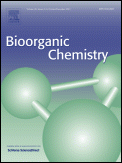
BIOORGANIC CHEMISTRY
Illuminating the complexities of chemical processes in biology.BIOORGANIC CHEMISTRY, published by Academic Press Inc., a prestigious imprint of Elsevier Science, represents a cornerstone in the fields of biochemistry, organic chemistry, and drug discovery. With an impressive Scopus rank placing it in the top quartiles across critical categories—including Q2 for Biochemistry and Drug Discovery, and Q1 for Organic Chemistry—this journal has established itself as a vital resource for researchers, professionals, and students alike. Featuring a diverse array of articles that explore innovative methodologies and emerging trends from 1971 to the present, BIOORGANIC CHEMISTRY effectively bridges the gap between laboratory research and practical applications. Although not an Open Access journal, its rigorous peer-review process ensures the delivery of high-quality, impactful research that drives advances in the understanding and application of biochemistry. With an aim to facilitate scientific discourse and collaboration, it invites contributions that further the exploration of chemical processes within biological systems.

BIOORGANIC & MEDICINAL CHEMISTRY LETTERS
Delivering essential knowledge in bioorganic chemistry.BIOORGANIC & MEDICINAL CHEMISTRY LETTERS, published by PERGAMON-ELSEVIER SCIENCE LTD, is a leading journal in the fields of biochemistry, drug discovery, and medicinal chemistry, designed to disseminate significant advances in these disciplines. Established in 1991, the journal spans various important categories, including Organic Chemistry and Pharmaceutical Science, with its 2023 Scimago Journal Rank placing it at Q2 in Organic Chemistry and Q3 in several other relevant fields. Though not an open-access publication, it provides invaluable insights into contemporary research and innovative methodologies, appealing to researchers, professionals, and students alike. The journal's commitment to quality and relevance makes it a vital resource for those aiming to stay at the forefront of bioorganic and medicinal chemistry developments. For more information, please visit the journal's website as it remains a critical platform for scholarly exchange, particularly for those engaged in interdisciplinary research.
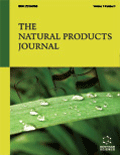
Natural Products Journal
Exploring the Essence of Nature in Health and HealingNatural Products Journal, a leading publication by Bentham Science Publishers, primarily focuses on the rapidly evolving field of Natural Products and their applications in Complementary and Alternative Medicine as well as Drug Discovery. With an ISSN of 2210-3155 and an E-ISSN of 2210-3163, this journal serves as an essential platform for researchers, professionals, and students dedicated to exploring the critical role of natural compounds in health and medicine. Since its inception in 2011, it has consolidated its reputation, achieving a Q3 ranking in Complementary and Alternative Medicine and a Q4 ranking in Drug Discovery as of 2023, illustrating its growing influence within the academic community. Although it currently does not operate as an Open Access journal, it remains a vital resource for cutting-edge research and developments in natural products, offering insightful contributions that pave the way for innovative therapeutic strategies. Located in the Netherlands, the journal is pivotal for those looking to stay at the forefront of research in natural substances and their multifaceted applications.

ACTA PHARMACEUTICA
Fostering collaboration through open-access research excellence.ACTA PHARMACEUTICA is a distinguished open-access journal published by SCIENDO, dedicated to advancing knowledge in the fields of medicine and pharmaceutical sciences. Established in 1992, the journal has made significant contributions to the scholarly community, providing a platform for innovative research and discussion. With a strong presence in both Q2 and Q3 quartiles across various categories including Pharmaceutical Science and Pharmacology, ACTA PHARMACEUTICA ranks favorably, positioning its contributions in the upper tiers of the field. The journal's commitment to open access since 2007 ensures that both practitioners and scholars have immediate access to cutting-edge developments, thereby fostering collaboration and knowledge sharing. With its scope spanning a broad spectrum of pharmaceutical and biomedical research, ACTA PHARMACEUTICA is an essential resource for researchers, professionals, and students keen to stay abreast of the latest advancements and trends in these vital areas of study.

CHEMISTRY LETTERS
Highlighting transformative research in diverse chemistry fields.Chemistry Letters, published by the Chemical Society of Japan, is a distinguished academic journal that focuses on pivotal developments in the field of chemistry. Since its inception in 1973, the journal has been a vital platform for the dissemination of novel research findings across various sub-disciplines, encompassing both theoretical advancements and practical applications. As a testament to its significance in the community, Chemistry Letters has achieved a Category Quartile of Q2 in the 2023 ranking for miscellaneous Chemistry journals, reflecting its respected position among peers. Although it does not offer Open Access, the journal remains accessible through institutional subscriptions, thus ensuring a wide reach for its valuable content. With an active scope ranging from general chemistry topics to specialized studies, it is ideal for researchers, professionals, and students alike who seek to contribute to and expand their knowledge within this dynamic field. The journal continuously aims to promote excellence in chemical research, facilitating dialogue and collaboration among chemists worldwide.
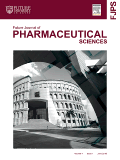
Future Journal of Pharmaceutical Sciences
Innovating Today for a Healthier TomorrowThe Future Journal of Pharmaceutical Sciences, published by Springer, stands as a vital resource in the realm of pharmaceutical research and innovation. Recognized for its open access initiative since 2015, this journal promotes extensive dissemination of cutting-edge discoveries, fostering collaboration among researchers, industry professionals, and students alike. With an ISSN of 2314-7245 and an E-ISSN of 2314-7253, it aims to bridge the gap between laboratory research and practical applications in the pharmaceutical sciences. Although specific metrics like HIndex and Scopus ranks are currently unavailable, the journal's commitment to high-quality, peer-reviewed content positions it as a promising platform for advancing pharmaceutical science. By engaging with this journal, contributors and readers can participate in the vibrant discourse shaping the future of drug development, therapeutic strategies, and healthcare solutions.
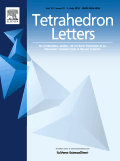
TETRAHEDRON LETTERS
Elevating Chemical Research to New HeightsTETRAHEDRON LETTERS, published by Pergamon-Elsevier Science Ltd, is a leading journal in the fields of Biochemistry, Drug Discovery, and Organic Chemistry, with a rich legacy since its inception in 1959. This prestigious journal serves as a vital resource for researchers and professionals dedicated to advancing the understanding of chemical sciences, featuring high-impact research that influences both academic and practical applications. Although it is currently classified in the third quartile across its categories for 2023, its rigorous peer-review process ensures the publication of quality research that contributes to the scientific community. With an ISSN of 0040-4039 and an E-ISSN of 1873-3581, TETRAHEDRON LETTERS is easily accessible for those in the academic landscape seeking to stay abreast of innovative developments. Researchers, professionals, and students alike will find invaluable insights and collaborative opportunities within the pages of TETRAHEDRON LETTERS, making it an essential read for anyone involved in the chemical sciences.

Journal of Natural Medicines
Illuminating the Path of Natural Medicine ResearchJournal of Natural Medicines, published by SPRINGER JAPAN KK, is a leading academic journal that plays a pivotal role in the advancement of research in the fields of Complementary and Alternative Medicine, Drug Discovery, Molecular Medicine, Organic Chemistry, and Pharmaceutical Science. Established in 1994 and set to continue until 2024, this journal serves as a vital conduit for the dissemination of groundbreaking research and innovative ideas that bridge traditional medicinal knowledge and modern scientific inquiry. With its impressive ranking in Scopus—ranking #12 out of 105 in Complementary and Alternative Medicine and holding a Q1 category quartile for 2023—it stands as a reputable source for high-quality, peer-reviewed articles. The journal's commitment to excellence is further underscored by its inclusion in the Springer network, providing researchers, professionals, and students with valuable insights and the latest developments in natural medicines. Although this journal operates under a subscription model, its profound impact on these interdisciplinary fields makes it an essential resource for anyone engaged in the study or practice of natural medicinal therapies.

RSC Medicinal Chemistry
Transforming Discoveries into Healing SolutionsRSC Medicinal Chemistry is a pivotal journal in the realm of medicinal chemistry, published by the esteemed Royal Society of Chemistry. With a focus on innovative research that intersects various disciplines such as biochemistry, drug discovery, pharmaceutical science, and organic chemistry, this journal serves as a vital resource for researchers, professionals, and students alike. Its impressive impact factor and notable rankings—positioning it within the Q1 and Q2 quartiles across critical categories—underscore its significance in advancing knowledge and fostering collaboration within the scientific community. RSC Medicinal Chemistry is dedicated to open access, ensuring that cutting-edge findings on drug design and therapeutic applications are freely available to enhance global research efforts. With a commitment to publication excellence from 2020 to 2024, it is a prominent platform where groundbreaking ideas meet practical implications, making it indispensable for anyone committed to the forefront of medicinal advances.
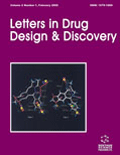
Letters in Drug Design & Discovery
Exploring New Horizons in Molecular MedicineLetters in Drug Design & Discovery is an esteemed journal dedicated to advancing the fields of Drug Discovery and Molecular Medicine. Published by Bentham Science Publishers, this journal offers a platform for the dissemination of innovative research and advanced methodologies, enhancing collaboration among researchers and professionals in pharmaceutical sciences. Despite its current Q4 ranking in Drug Discovery and Molecular Medicine and Q3 in Pharmaceutical Science for 2023, the journal is committed to improving its presence in the academic community by providing quality, peer-reviewed publications that cover various aspects of drug design and discovery, including novel therapeutic approaches and methodologies. With a focus on both foundational and cutting-edge research from around the globe, Letters in Drug Design & Discovery is pivotal for those seeking to stay abreast of developments in drug development and molecular research. Researchers are encouraged to submit their work, engage with the burgeoning field, and contribute to the ongoing dialogue driven by this journal, which spans the years from 2005 to 2024. While the journal does not currently offer open access, its contributions remain accessible to a wide range of academic and professional audiences.